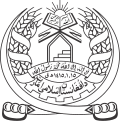 |
|---|
The Taliban has ruled Afghanistan as the Islamic Emirate of Afghanistan since taking control by force in 2021, overthrowing the internationally recognized Islamic Republic of Afghanistan. The takeover was widely criticized by the international community. As of July 2025, only one member state of the United Nations, Russia, [1] has extended diplomatic recognition to the new regime, even though many states maintain nominal relations with Afghanistan.
Contents
- 1996–2001
- 2021–present
- National governments
- International organizations
- United Nations votes
- See also
- References
The Taliban previously ruled Afghanistan from 1996 to 2001 and received limited diplomatic recognition, with the United Nations and most countries continuing to recognize the Islamic State of Afghanistan. The Taliban has campaigned for international recognition since the takeover, gradually taking over the Islamic Republic's foreign diplomatic missions. Ousted president Ashraf Ghani has largely remained silent since the takeover, and has not formed a government-in-exile. Ghani's vice president Amrullah Saleh declared himself caretaker president and relocated to Panjshir Province after the Taliban takeover with the support of the National Resistance Front (NRF). However, he fled Afghanistan after the Taliban quickly captured the province. Although the NRF continues to wage a guerrilla insurgency, it has failed to take any territory and neither Saleh nor the NRF have received any international support, leaving the Taliban as the only viable claimant to Afghanistan's government. [2] [3] [4] [5]
Several countries have vowed never to recognize the Islamic Emirate, and others have said they will do so only if human rights in the country are respected (in particular, those of women). Some countries have accredited Taliban diplomats despite not recognizing the Islamic Emirate, and some have appointed new ambassadors to Afghanistan which have been accepted by the Taliban. Other countries, including Canada and Tajikistan, have designated the Taliban as a terrorist organization. [6] [7] [8] Kazakhstan removed the prohibition in 2023 after a controversial business forum featuring Afghan Minister Nooruddin Azizi. [9]
